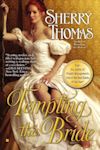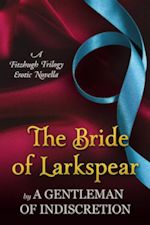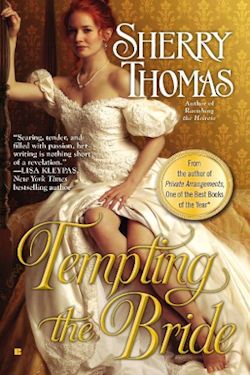Berkley
October 2, 2012
Mass Market Paperback
ISBN-13: 9780425251027
ISBN-10: 0425251020
Order Ebook:
Tempting the Bride
Read an Excerpt »
Order the Book »
Connected Books »
Helena Fitzhugh understands perfectly well that she would be ruined should her secret love affair be discovered.But when a rendezvous goes wrong and she is about to be caught in the act, it is only with the greatest reluctance that she accepts help from David Hillsborough, Viscount Hastings, and announces that she has eloped with David.
For Helena has despised David since they were children—the notorious rake has tormented her all her life. David, on the other hand, has always loved Helena. His pride, however, will never let him admit the secrets of his heart.
A carriage accident the day after their "elopement," however, robs Helena of her memory. The slate is wiped clean. At last David dares to bare his love and she finds him both fascinating and desirable. But what will happen when her memory returns and she realizes she has fallen for a man she has sworn never to trust?
Share:
Excerpt
Prologue
David Hillsborough, Viscount Hastings, had never been in love. And he had most certainly never been in unrequited love. Why, his was a heart buoyantly and blissfully unattached, while he devoted himself to sample all the charms life had to offer a young, wealthy, and handsome bachelor.

This was, in any case, his official position.
He suspected that several of those closest to him had guessed the truth—possibly a long time ago, as his particular instance of unrequited love had lasted nearly half of his life. But he took comfort in the fact that she hadn’t the slightest idea. And, God willing, she never would.
For he would be in hell if she ever learned.
Not that he was very far from it at the moment, watching the girl of his dreams, Miss Helena Fitzhugh, gazing at another man with adoration. Her elder sister was the acknowledged Great Beauty of their time, but it was always Miss Fitzhugh from whom he couldn’t look away. Her flame–bright hair, her luminous skin, her clever, wicked eyes.
He did not begrudge her falling in love with another. After all, if he refused to participate in the contest, he could not complain when someone else won the prize. But he did mind, very much, that this man on whom she lavished her attention did not deserve it in the least.
Years ago, Andrew Martin had had the opportunity to marry her. But his mother had expected him to marry someone else in order to unite two adjacent properties. Lacking the courage to defy the elder Mrs. Martin, he’d married that someone else.
Even in a land full of cold, formal marriages, Mr. Martin’s marriage stood out for its coldness and formality. Husband and wife dined at different times, moved in different circles, and communicated almost entirely via written notices.
None of it mattered. Happy or otherwise, a married man was a married man, and a respectable young lady ought to search elsewhere for fulfillment.
Miss Fitzhugh was a rule breaker. Until now, however, those she’d trampled had not been so much rules as recommendations. When she became the only one of her siblings to pursue a university education, it was looked upon as an eccentricity. And when, upon coming into her small inheritance, she’d used the funds as capital for a publishing firm that she ran herself, the venture was dismissed as simply another idiosyncrasy in the family—after all, her brother, Earl Fitzhugh, managed the tinneries his heiress wife had inherited.
But indulging in a close friendship with a married man pushed boundaries of acceptable behavior. She needed not commit any actual sins; the appearance of impropriety would be quite enough to wound her.
The drawing room at Lord Wrenworth’s country estate was awash in laughter and good cheer. Mrs. Denbigh, Miss Fitzhugh’s married friend who was her chaperone at the Wrenworth house party, was all too busy amusing herself. Hastings waited for a natural pause in the conversation in which he’d been taking part, excused himself, and crossed the room to where Miss Fitzhugh and Martin sat on a chaise longue, their bodies turned toward each other, effectively blocking anyone else from joining their conversation.
"Mr. Martin, what are you still doing here?" Hastings asked. "Haven’t you your next great tome to write?"
Miss Fitzhugh answered for Martin. "But he is working. He is conferring with his publisher."
"And he has been conferring with his publisher since morning, if I’m not mistaken. A cook can confer with the mistress of the house all day long, but that doesn’t put dinner on the table. Mr. Martin would quite deprive his readers of his next excellent volume of history were he to spend all his hours talking about it and none setting the actual words to paper."
Martin reddened. "You have a point, Lord Hastings."
"I always have a point. I understand that you are here to work and that you’ve asked Lord Wrenworth to put a nice, quiet room at your disposal. You haven’t put that room to use, have you?"
Martin reddened further. "Ah—"
"I, personally, cannot wait for the next appearance of Offa of Mercia."
"You’ve read the book?"
"Of course. Why do you look so surprised? Did I not display a ferocious intelligence and a wide–ranging curiosity when I was at university?"

"Well, yes."
"Then consider yourself honored to count me among your readership. Now off you go. Write deep into the night. And stop monopolizing Miss Fitzhugh. You are a married man, remember?"
Martin chuckled uneasily and rose. Miss Fitzhugh shot Hastings an icy look. He ignored it, shooed Martin away, and took the spot on the chaise he’d vacated.
"I don’t believe you read Mr. Martin’s book."
He read every book she published from cover to cover, even the ones she took on purely for financial gain. "First page and last page—and did I not sound impressive discussing it?"
Her gaze brimmed with disdain. "You sounded pompous and overbearing, Hastings. And to dismiss my friend from my presence? Truly, I expected better, even of you."
He leaned back against the armrest of the chaise. "Let us spend no more words on Mr. Martin, who is surely beneath your notice. I’d much prefer to speak of how delicious you look tonight, my dear Miss Fitzhugh."
He was not subtle about where his gaze dropped: directly into her décolletage. He’d loved her since before she’d sprouted breasts and felt no compunction in enjoying the sight of them anytime her neckline allowed.
In reaction she snapped open her fan and neatly blocked his view of her bosom. "Don’t let me keep you, Hastings. Mrs. Ponsonby is trying to get your attention, if I’m not mistaken."
"You are not mistaken," he murmured. "They are all trying to get my attention, all the women I’ve ever met."
"I know how this goes. You want me to protest that I’ve never wanted your attention. Then you’d counter that I’ve only ever pretended to ignore you, and that all along my indifference was my pitiful attempt to pique your curiosity."
She sounded half–bored. He used to be able to anger her to a greater intensity, and for a longer duration. More than even her scorn he feared her apathy—the opposite of love was not hate, but indifference; to exist in such proximity to her yet make no impression upon her awareness, upon her soul.
He tsked. "Miss Fitzhugh, I am never that unoriginal. Of course you want my attention, but it is only so you can toss it back into my face. You take great pleasure in thwarting me, my dear."
A spark flashed in her eyes—gone almost before he’d perceived it. He lived for those moments, moments when she was forced to look at him as who he was, instead of who she believed him to be.
The worst thing about falling in love with her so early in life was that he’d been an absolute snot at fourteen, at once arrogant and self–pitying. Almost as bad was the fact that he’d been nearly half a foot shorter than she at their first meeting—she’d been five foot nine, and he barely five foot four. Though she was only a few weeks older than he was, she’d looked upon him as a child—while he broiled with the heat and anguish of first love.
When nothing else garnered him her attention, he turned horrid. She was disgusted by this midget who tried to trick her into broom closets to steal kisses, and he was at once miserable and thrilled. Disgust was better than indifference; anything was better than indifference.
By the time his height at last exceeded hers—six foot two to her five foot eleven—and his baby fat melted away to reveal cheekbones sharp enough to cut diamonds, her opinion was firmly set against him. And he, no longer self–pitying but proud as ever, refused to humble himself and ask for a fresh chance.
Not that he didn’t want to. Every time he came across her, with her perfect assurance, her winsome face, her lithe, sylphlike figure, he meant to repent aloud all his past stupidity.
Yet all he ever did was further his record of obnoxiousness. A women’s college, is that what they call a hotbed of lesbianism these days? Becoming a publisher—so you think there still aren’t enough bad books to be had? That is a ravishing dress, my dear, dear Miss Fitzhugh; a shame you can’t fill it out with a few more curves—or any, for that matter.
Her ripostes always set his heart aflame. I knew I chose a women’s college for all the right reasons, but a hotbed of lesbianism—my goodness—that is like discovering a vein of gold on the land you’ve just bought, isn’t it? Of course you would find the vast majority of books taxing, given your trouble with basic literacy—rest assured I will publish a few picture books just for you.
And his favorite, in response to his slur against her figure: My dear Lord Hastings, I’m afraid I didn’t quite hear you. You are mumbling. Is your mouth full of—why, it is!—indeed, a whole cluster of sour grapes. With the tip of her index finger, she’d drawn a line from her chin to just beneath the top of her neckline, cast him a look of pure derision, and swept off. And he’d never been more hopelessly in love.
"You are staring at me, Hastings," said the present–day Miss Fitzhugh, an edge to her voice.

"Yes, I know, grieving over your soon–to–come deterioration—of course, you are still comely, but age will inexorably catch up with you. You really aren’t getting any younger, Miss Fitzhugh."
She fluttered her fan. "And do you know what they say of women of a certain age, what they want above all?"
Desire simmered in him at her not–quite–smile. "Do tell."
"To be rid of you, Hastings. So that they don’t have to waste what remains of their precious few years suffering your lecherous looks."
"If I stopped looking at you lecherously, you’d miss it."
"Why don’t we test that hypothesis? You stop and I’ll tell you after ten years or so whether I miss it."
He gazed at her a little longer. He could watch her all night—in fact, he would watch her all night, from wherever he was in Lord Wrenworth’s drawing room—but the time had come for him to depart her chaise before she forcibly evicted him.
He rose and bowed slightly. "You wouldn’t last two weeks, Miss Fitzhugh."
The ladies retired by half past ten. The gentlemen smoked a few cigars, played a few hands of cards and a few games of snooker. At half past twelve, Hastings was the last person to head up.
Except he didn’t go directly to his room. Instead he took himself to an alcove that allowed him a limited view of her room—unrequited love meant staring at closed doors, imagining otherwise. A faint light still shone under her door; she was probably reading in bed.
Just a few more pages.
Hampton House, her childhood home, had been of a modest size. When he’d visited, he’d had a room three doors down from hers. Every night, her governess would come around and urge her to turn off her lamp. Invariably she would answer, Just a few more pages.
And when the governess had left, he would slip out of his own room and peer at her door until her light was extinguished at last, before he returned to bed to stew anew in lust and yearning.
A habit that he’d kept to this day, whenever they happened to be under the same roof.
Her light turned off. He sighed. How long would he keep at this? Soon he would be twenty–seven. Did he still plan to stand in a dark passage in the middle of the night and gaze upon her door when he was thirty–seven? Forty–seven? Ninety–seven?
He ran his hand through his hair. Time for his lonely bed, which he could have filled with women, but for his reluctance to sleep with anyone else when Miss Fitzhugh was in the vicinity. Perhaps it was some hidden wellspring of gentlemanliness protesting this act of hypocrisy, or perhaps it was merely him being superstitious, afraid that such an infraction would destroy what slender hope he still had.
Her door opened.
He sucked in a breath. Had she sensed him? He pressed his back into the curved inside of the alcove. It was too dark to see well, but she seemed to be poised on the threshold. Was she searching for him?
The door closed softly. He let out the breath he held—she must have returned to her room.
Suddenly she was before him, a disturbance in the air. His heart leaped to the roof of his mouth; endless disastrous possibilities flashed across his mind, all his years of careful pretenses stripped bare at once. She would lift one fine brow and laugh at the futility of his desires.
She walked past him. He blinked, disoriented by the abrupt evaporation of what had promised to be an eventful confrontation. She hadn’t come for him; she was going for a snack, perhaps, or another book. But she did not even have a hand candle to illuminate her way. It was as if she didn’t want anyone to see her—or where she was going.

He might not have been able to follow her had it been summer—she’d have heard his footsteps on the echoing floor. But it was winter and a thick carpet had been laid down. He walked soundlessly, keeping to the walls.
She approached the stairs. If she were headed for the warming kitchen or the library, she would go down the steps. She didn’t: She climbed up. Most of the guests had been placed on the same floor, the unmarried ladies and gentlemen put into separate wings. Above, in this wing, at least, were only the guests who’d arrived late—and Mr. Andrew Martin.
An airless sensation overtook him. He could not possibly be correct in his suspicions. She was far too clear–thinking a woman to visit the room of any man, let alone a married man, at this hour of the night.
On the next floor there was only one door with light still underneath. And when she approached, the door opened from inside. In the gap stood Andrew Martin, smiling.
She slipped in. The door closed. Hastings remained numbly in place.
She wasn’t just Martin’s friend and publisher. She was his lover.
He found himself seated on the floor—his elbows on his knees, his head in his hands. She stayed in Martin’s room for two hours, leaving as quietly as she’d arrived, slipping down the stairs like a phantom of the night. Hastings did not return to his own room until almost dawn.
She had no obligation to care for his sentiments, but did she not care about her own future? What she had done was utter madness. Had she slipped into the room of a bachelor, Hastings would be no less annihilated, but at least then her lover could marry her, should the worst happen.
With Andrew Martin there was no such last resort.
Late the next morning he came across the two of them in the library, reading in two adjacent chairs. She radiated satisfaction. He turned around and walked out.
That night she visited Martin again. Hastings stood guard near the stairs, trying, unsuccessfully, to not imagine what might be taking place inside Martin’s room.
He spent his second sleepless night.
The following night, he sat on the carpeted steps, his head resting against the cold banister. He had to leave in the morning—he never remained away from his daughter for longer than three days. On his way home, should he stop by Fitz’s estate and gently break the news of Miss Fitzhugh’s misbehavior? He might be nothing and no one to Helena Fitzhugh, but her twin brother, Fitz, was his best friend.
Would she ever forgive him if he did?
He sat up straight. A pair of giggling guests were coming up the stairs. He recognized their whispering voices: a man and a woman, married, but not to each other.
They sounded more than a little drunk.
His heart pounding, he coughed loudly. The would–be adulterers fell silent. After a few seconds there came a hushed exchange. They turned around and descended.
It was several minutes before he could unclench his fingers from around the banister.
Not that those two were certain to have tried Martin’s door. Not that Martin’s door wouldn’t have already been securely locked, with a chair wedged beneath the door handle as an additional bulwark against intruders. But if this continued, someday, somewhere, someone would open a door that hadn’t been properly secured.
He slowly rose to his feet, leaning on the balustrade. He knew her. It was easier to pull a lion’s teeth than to change her mind. She would barrel down this path, refusing to be diverted, until she crashed into the limit of society’s tolerance.

And he, as much as even now he still wanted to, could not always protect her.
A lover’s embrace made one look favorably upon the entirety of the universe. As Helena Fitzhugh returned to her empty, unlit bedroom, she sighed in contentment.
Or rather, as much contentment as possible, given that her particular lover’s embrace had happened through her chemise and his nightshirt—Andrew was adamant that they not risk a pregnancy. But still, how new and thrilling it was to kiss and touch in the comfort and privacy of a bed, almost enough to pretend that the past five years never happened and that the only thing that separated them were two layers of thin, soft merino wool.
"Hullo, Miss Fitzhugh," came a man’s voice out of the darkness.
Her heart stopped. Hastings was her brother Fitz’s best friend—but not exactly a friend to her.
"Mistook my room for one of your paramours’?" She was proud of herself. Her voice sounded even, almost blasé.
"Then I would have greeted you by one of their names, wouldn’t I?" His voice was just as nonchalant as hers.
A match flared, illuminating a pair of stern eyes. It always surprised her that he could look somber—intimidating—at times, when he was so frivolous a person.
He lit a hand candle. The light cast his features into sharp relief; the ends of his hair gleamed bronze. "Where were you, Miss Fitzhugh?"
"I was hungry. I went to the butler’s pantry and found myself a slice of pear cake."
He blew out the match and tossed it in the grate. "And came back directly?"
"Not that it is any of your concern, but yes."
"So if I were to kiss you now, you would taste of pear cake?"
Trust Hastings to always drag any discussion into the gutter. "Absolutely. But as your lips will never touch mine, that is a moot point, my lord Hastings."
He looked at her askance. "You are aware, are you not, that I am one of your brothers’ most trusted friends?"
A friendship she’d never quite understood. "And?"
"And as such, when I become aware of gross misconduct on your part, it behooves me to inform your brother without delay."
She lifted her chin. "Gross misconduct? Is that what one calls a little foray to the butler’s pantry these days?"
"A little foray to the butler’s pantry, is that how one refers to the territory inside Mr. Martin’s underlinens these days?"
"I don’t know what you mean."

"Should I use the scientific names?"
And wouldn’t he enjoy doing that. But as it was her policy to never let him enjoy himself at her expense, she declared, "Mr. Martin and I are friends of long standing and nothing more."
"You and I are friends of long standing and—"
"You and I are acquaintances of long standing, Hastings."
"Fine. Your sister and I are friends of long standing and yet she has never come to spend hours in my room. Alone. After midnight."
"I went for a slice of cake."
He cocked his head. "I saw you go into Mr. Martin’s room at forty minutes past midnight, Miss Fitzhugh. You were still there when I left twenty minutes ago. By the way, I also witnessed the same thing happening for the past two nights. You can accuse me of many things—and you do—but you cannot charge me with drawing conclusions on insufficient evidence. Not in this case, at least."
She stiffened. She’d underestimated him, it would seem. He’d been his usual flighty, superficial self; she wouldn’t have guessed he had the faintest inkling of her nighttime forays.
"What do you want, Hastings?"
"I want you to mend your ways, my dear Miss Fitzhugh. I understand very well that Mr. Martin should have been yours in an ideal world. I also understand that his wife has been praying for him to take a lover so she could do the same. But none of it will matter should you be found out. So you see, it is my moral obligation to leave at first light and inform your siblings, my dear, dear friends, that their beloved sister is throwing away her life."
She rolled her eyes. "What do you want, Hastings?"
He sighed dramatically. "It wounds me, Miss Fitzhugh. Why do you always suspect me of ulterior motives?"
"Because you always have one. What do I have to do now for your silence?"
"That will not happen."
"I refuse to think you cannot be bought, Hastings."
"My, such adamant faith in my corruptibility. I almost hate to disappoint you."
"Then don’t disappoint me. Name your price."
His title was quite new—he was only the second Viscount Hastings after his uncle. The family coffer was full to the brim. His price would not be anything denominated in pounds sterling.
"If I say nothing," he mused, "Fitz will be quite put out with me."
"If you say nothing, my brother will not know anything."

"Fitz is a clever man—except when it comes to his wife, perhaps. He will learn sooner or later, somehow."
"But you are a man who lives in the present, aren’t you?"
He lifted a brow. "That wouldn’t be your way of saying that I am empty–headed and incapable of thinking of the future, would it?"
She didn’t bother with an answer to that question. "It is getting late—not too long now before someone comes to lay a new fire. I don’t want you to be seen in my room."
"At least I can marry you to salvage your reputation should that happen. Mr. Martin is in no position to do so."
"That is quite beside the point. Tell me what you want and begone."
He smiled, a crooked smile full of suggestions. "You know what I want."
"Please don’t tell me you are still trying to kiss me. Have I not made my lack of interest abundantly clear on this matter?"
"I don’t want to kiss you. However, you will need to kiss me."
She, kiss him?
"Ah, I see you were hoping to stand quiescent and think of Christian martyrs mauled by the lions of the Colosseum. But as you always tell me, I am a man of unseemly tastes. So you must be the lion, and I the martyr. I shall expect exceptional aggression, Miss Fitzhugh."
"If I were a lion, I’d find you a piece of rotten fish, not at all to my taste and hardly edible, whereas I’ve just dined on the finest gazelle in the entire savanna. You will excuse me if I fail to summon any enthusiasm to fall upon you."
"Quite the contrary. I cannot excuse such failure. Not in the least. You will somehow summon the enthusiasm or I shall be on the earliest train headed south."
"And if I do manufacture enough false zeal to satisfy you?"
"Then I shall say nothing to anyone of Mr. Martin."
"Your word?"
"Your word that the kiss will be more debauched than any you’ve pressed upon Mr. Martin."
"You are a pervert, Hastings."
He smiled again. "And you are just the sort of woman to appreciate one, Miss Fitzhugh, whether you realize it or not. Now, here is what I want you to do. You will seize me by the shoulders, push me against the wall, reach your hand under my jacket—"
"I feel my bile rising."
"Then you are ready. Onward. I await your assault."

She grimaced. "How I hate to spoil a perfect record of repelling you."
"Nothing lasts forever, my dear Miss Fitzhugh. And remember, kiss me passionately. Or you’ll have to do it again."
She might as well get it over with.
She closed the space that separated them in two big strides and gripped him by the sleeves of his dressing gown. Instead of pushing him backward as he’d instructed—as if she’d allow him to dictate the specifics of her ordeal—she yanked him toward her, fastened her mouth to his, and imagined herself a shark with hundreds of razor–sharp teeth.
Or perhaps she was a minion of the underworld, her mouth a welter of burning acid and sulfur fumes, devouring his soul, savoring all the idle immoralities he’d committed in his lifetime as a palate cleanser between courses of more substantial sins.
Or a Venus flytrap, full of delicious nectar, but woe was he who thought he could dip a proboscis inside and sample her charms. Instead, she would digest him in place, stupid sod.
Vaguely she sensed something hard and smooth against her shoulder blades. They’d been in the middle of her room; why was she being pressed into a wall? And why, all of a sudden, was she the one being devoured?
The muscles of his arms were tight and hard beneath her hands. His person was as tall and solid as a castle gate. His mouth, instead of tasting like a furnace of greedy lust, was cool and delicious, as if he’d just downed a long draft of well water.
She shoved him away and wiped her lips. She was panting. She didn’t know why she ought to be.
"My," he murmured. "As ferocious as anything I’ve ever imagined. I was right. You do want me."
She ignored him. "Your word."
"I will say nothing of Andrew Martin to anyone. You may depend on that."
"Leave."
"Gladly, now that I have what I came for." He smirked. "Good night, my dear. You were well worth the wait."
Copyright © 2012 by Sherry Thomas. Excerpted by permission of Berkley Books, a division of Penguin Group (USA). All rights reserved. No part of this excerpt may be reproduced or reprinted without permission in writing from the publisher.



















